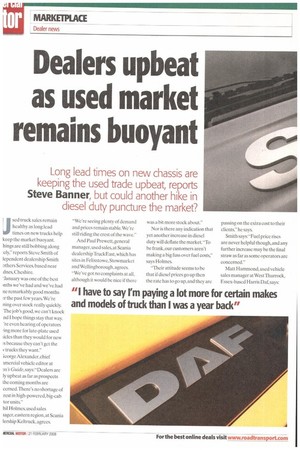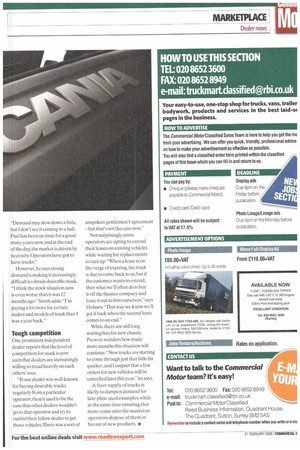Dealers upbeat as used market remains buoyant
Page 52

Page 53

If you've noticed an error in this article please click here to report it so we can fix it.
Long lead times on new chassis are keeping the used trade upbeat, reports Steve Banner, but could another hike in diesel duty puncture the market?
Jsed truck sales remain healthy as long lead times on new trucks help keep the market buoyant. hings are still bobbing along :ely," reports Steve Smith of lependent dealership Smith others Services, based near dnes, Cheshire.
'January was one of the best inths we've had and we've.had ne remarkably good months !.r the past few years. We're fling over stock really quickly. The job's good, we can't knock nd 1 hope things stay that way. 're even hearing of operators ing more for late-plate used tides than they would for new :s because they can't get the v trucks they want."
ieorge Alexander, chief imercial vehicle editor at ,...ss 's Guide, says: "Dealers are ly upbeat as far as prospects the coming months are cemedllere's no shortage of rest in high-powered, big-cab tor units."
hil Holmes, used sales lager, eastern region, at Scania lership Keltruck, agrees. "We're seeing plenty of demand and prices remain stable. We're still riding the crest of the wave."
And Paul Prewett, general manager, used sales, at Scania dealership TruckEast, which has sites in Felixstowe, Stowmarket and Wellingborough, agrees. -We've got no complaints at all, although it would be nice if there was a bit more stock about."
Nor is there any indication that yet another increase in diesel duty will deflate the market. "To be frank, our customers aren't making a big fuss over fuel costs," says Holmes.
"Their attitude seems to be that if diesel prices go up then the rate has to go up, and they are passing on the extra cost to their clients." he says.
Smith says:"Fuel price rises are never helpful though, and any further increase may be the final straw as far as some operators are concerned."
Matt Hammond, used vehicle sales manager at West Thurrock, Essex-based Harris Dat says: "Demand may slow down a little, but I don't see it coming to a halt. Fuel has been an issue for a good many years now, and at the end of the day, the market is driven by necessity. Operators have got to have trucks."
However, he says strong demand is making it increasingly difficult to obtain desirable stock. "I think the stock situation now is even worse than it was 12 months ago." Smith adds: "I'm paying a lot more for certain makes and models of truck than I was a year back."
Tough competition
One prominent independent dealer reports that the level of competition for stock is now such that dealers are increasingly willing to tread heavily on each others' toes.
' "If one dealer was well-known for buying desirable trucks regularly from a particular operator, then it used to be the case that other dealers wouldn't go to that operator and try to outbid their fellow dealer to get those vehicles.There was a sort of unspoken gentlemen's agreement — but that's not the case now."
Not surprisingly, some operators are opting to extend their leases on existing vehicles while waiting for replacements to turn up."When a lease is on the verge of expiring, the truck is due to come back to us, but if the customer wants to extend, then what we'll often do is buy it off the finance company and lease it out to him ourselves," says Holmes."That way we know we'll get it back when the second lease comes to an end," While there are still long waiting lists for new chassis. Prewett wonders how many more months this situation will continue. "New trucks are starting to come through just that little bit quicker, and I suspect that a few orders for new vehicles will be cancelled later this year," he says.
A freer supply of trucks is likely to dampen demand for late-plate used examples, while at the same time ensuring that more come onto the market as operators dispose of them in favour of new products.












































































































































































